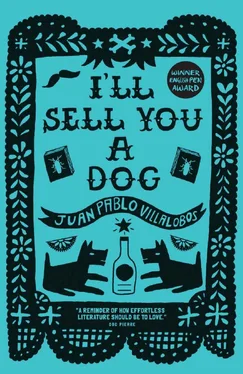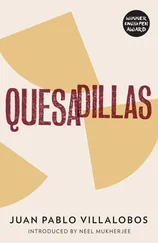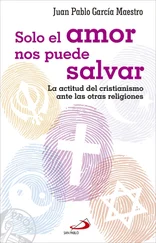The next morning, Francesca was waiting out in the hallway and when I left my apartment she ran over to confront me.
‘That’s the last thing we need! Taco sellers who think they’re art historians.’
‘Do you know what a customer once said to me?’ I replied. ‘That that was precisely what we needed: taco sellers who knew about art, who were interested in art.’
‘Who was your customer? Gorky?’
‘If Gorky were alive he’d be shocked at the price of beer in museum cafés.’
I complained to the greengrocer that her theory had failed.
‘All I managed to do was blow up my blender.’
‘It must be telepathy, then.’
‘I knew it! You’re mad.’
‘That’s precisely what the CIA’s strategy is — don’t you get it? They use crazy techniques so that no one believes it when they are discovered.’
‘So what does she get out of spying on me?’
‘You should know, you’re probably a danger to the system.’
‘Yeah, right!’
‘Well, I’ve always thought you were suspicious, you know? All that clowning around’s got to be a ploy to distract people. Who knows what secrets you’re hiding… Or perhaps the future of the human race depends on your notebook, just imagine!’
With the help of a comrade who was undercover, she’d gone so far as to get hold of a list of names of supposed CIA agents in Mexico. We couldn’t find Francesca’s.
‘But that’s not her real name!’ the greengrocer said.
So we looked for her real name, or at least, the one the salon members called her by, the same one her post was addressed to and with which she signed the minutes of the Residents’ Association meetings. That one wasn’t on the list, either.
‘You see?’ I said.
‘That only proves one thing: that name’s false, too. You really think she’s going to use her real name? I’m telling you, she’s on a mission! Actually, now I think of it, we shouldn’t be using our real names either.’
‘What do you want to be called?’ I asked her.
‘I don’t know, can you think of a name? Pick a pretty one.’
‘What about Juliet?’
‘Juliet?’
‘Yeah, but pronounced the French way, Juliette , so it packs more of a punch.’
‘I like it! What about you?’
‘I want to be called Teo.’
‘Mateo?’
‘As if!’
‘Well what, then?’
‘Teodoro, but just call me Teo.’
You had to say her name Juliette to make Francesca jealous. Then Juliet would dare me to force my way into 3-D, Francesca’s apartment, to confirm her theory. This usually happened around the third beer, when I would wisely take my leave. I needed to rest a little in order to get through the rest of the day. On my way back from the greengrocer’s shop, when I crossed the lobby and looked around at the salon members, all hypnotised by their books, perfectly pacified, I’d call out:
‘Still here? How are your piles doing?’
And Francesca would shout:
‘ Juliette is the name of a French whore!’
One morning the salon was cancelled because a poet had died and everyone rushed off to mourn the dead man. Everyone except Hipólita, whose varicose veins prevented such exertion. I was about to shoot off like a rattletrap rocket to the bar on the corner when I ran into her, putting her hand into the letter boxes to deposit a piece of paper: she was organising an exhibition of little birds modelled out of bread dough down in the lobby. I folded up the invitation to the vernissage and put it in my back pocket, and was almost at the door when Hipólita intercepted me.
‘You’re an ungrateful wretch.’
I turned around to face her. She had come close enough to the entrance that the morning light accentuated the down on her upper lip. Away from the lobby’s deceptive gloom it was a proper moustache.
‘I don’t get a mention in your novel,’ she explained.
‘You know it’s not a novel.’
‘You must think I’m so insignificant.’
‘My dear, you talk like one of Frida Kahlo’s paintings: nothing but moaning. Hey, did you see that?’
I pointed at the right-hand wall of the lobby, covered in damp patches, and then fled as fast as my bunions allowed. That night I wrote in my journal about a childhood memory: my mother’s brother, a bachelor who had been the first taco seller in the family, had a moustache so outrageous he used to get bits of food stuck in it.
‘It’s a northern thing,’ my mother would say, excusing him.
Her family was from San Luis Potosí which, technically speaking, wasn’t even in the north. If anything it was the south of the north. I had seen him spend an entire Sunday afternoon with the tail end of a jalapeño pepper entangled in his whiskers.
The next day there were new chairs in the lobby. Reclining wooden ones, with cushioned backs and seats, super comfortable. They’d nicked them from the poet’s funeral. These were truly dangerous people: they’d lugged them all the way from Bellas Artes, six stops on the metro. The new chairs didn’t fit in the room we used as a dumping ground, where the folded Corona beer chairs were stored. They started leaving the new ones lined up on either side of the lobby, like in a waiting room. The salon members considered them the pinnacle of elegance. The cockroaches rather liked them, too.
Posterity decreed that the dead poet was only mediocre: he failed to merit a statue or even an avenue named after him, never mind a place in the Rotunda of Illustrious Persons. They named a dirt road after him in Irapuato, where he’d been born. Then another poet died (poets were always dying). The salon members seized the opportunity to steal another chair for Hipólita. This poet had a statue erected to him in a park. The pigeons were over the moon.
The building was fumigated and we had to stay out for a whole day. The council started cutting the water off regularly because there was a drought. The canapés from the private view for the exhibition of bread-dough birds went off, and there was an outbreak of diarrhoea. The supermarket delivery boy was replaced; the new one was accused of stealing a tin of jalapeño peppers. The bulb on the third floor went. Someone left the main entrance open and let in the Mormons, who started going from door to door. The salon read In Search of Lost Time in a commemorative edition which included all seven volumes of Proust’s novel. Four thousand, two hundred and thirty pages long, hardback, with leaves thin as tracing paper and weighing in at almost three and a half kilos (those with arthritis were excused). Signatures were collected to bring back the previous supermarket delivery boy. The bulb on the first floor went. The cockroaches, cool as cucumbers.
My mother had taken less than a week to find a substitute for the dog: an insufferable mutt she had christened Turnup, because it just turned up one day at the front door and started to scratch it. Turnup would eat anything within reach of his muzzle, not just stockings, but my mother imagined it was the reincarnation of that other dog she had loved so much. She didn’t say this, of course, but she didn’t need to: she would regularly forget herself and call Turnup by the deceased dog’s name. Over the ten years he was alive, that dog managed to eat every object in the house that wasn’t nailed down, including clothes pegs, refrigerator seals and tons of tubes of toothpaste, which were his weakness: if someone left the bathroom door open, he would jump up and knock over the glass where we kept them. Despite this he never got fat, and remained skeletal until the end of his days. My mother forgave him everything while punishing me and my sister for the slightest offence. We really had it in for that dog. Mum would ground us for a week for any misdemeanour, as this was how she solved everything in life, by locking us up. This meant being condemned to evenings of tedium, spent begging my mother to lift the punishment. In retrospect, the faith placed by that generation in punishment as a way of building character seems astonishing.
Читать дальше












